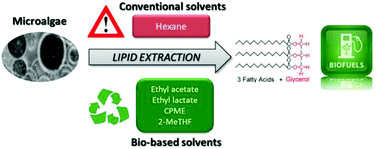当前位置:
X-MOL 学术
›
Green Chem.
›
论文详情
Our official English website, www.x-mol.net, welcomes your
feedback! (Note: you will need to create a separate account there.)
Enhanced microalgal lipid extraction using bio-based solvents for sustainable biofuel production
Green Chemistry ( IF 9.3 ) Pub Date : 2017-10-30 00:00:00 , DOI: 10.1039/c7gc02735d Wan M. Asyraf Wan Mahmood 1, 2, 3, 4, 5 , Constantinos Theodoropoulos 1, 2, 3, 4, 5 , Maria Gonzalez-Miquel 1, 2, 3, 4, 5
Green Chemistry ( IF 9.3 ) Pub Date : 2017-10-30 00:00:00 , DOI: 10.1039/c7gc02735d Wan M. Asyraf Wan Mahmood 1, 2, 3, 4, 5 , Constantinos Theodoropoulos 1, 2, 3, 4, 5 , Maria Gonzalez-Miquel 1, 2, 3, 4, 5
Affiliation

|
Global energy crisis and climate change urge to find alternative energy sources to help in transitioning from a petroleum-based to a more sustainable bio-based economy. In this context, microalgal biomass is regarded as a promising renewable energy feedstock for biodiesel production due to its high lipid accumulation and growth rate. Conventional extraction methods for lipid recovery from microalgae rely on hazardous petroleum-derived volatile organic compounds (VOCs), such as hexane, which is being strictly regulated in the chemical industry. Therefore, the goal of this work is to assess the feasibility of using renewable bio-based solvents for microalgal lipid extraction to develop environmentally-friendly biofuel production processes. In particular, lipid extraction studies were conducted on two microalgal strains, Chlorella vulgaris and Nannochloropsis sp., via the Soxhlet method using various bio-based solvents (i.e. ethyl acetate, ethyl lactate, cyclopentyl methyl ether (CPME) and 2-methyltetrahydrofuran (2-MeTHF)), compared to the benchmark VOC solvent (hexane). All bio-based solvents outperform the extraction capacity of hexane, with 2-MeTHF and ethyl lactate, respectively, providing two-fold and three-fold lipid extraction yields in comparison with the conventional solvent, hexane. Moreover, fatty acid methyl ester (FAME) profiles produced from both strains indicate the suitability of bio-based solvents to extract target lipids for biodiesel production. In addition, the overall biodiesel yield is significantly increased when using bio-based solvents for microalgal lipid extraction, with 2-MeTHF duplicating the overall biodiesel yield provided by hexane in both strains, Chlorella vulgaris and Nannochloropsis sp. Lipid extraction with ethyl lactate also duplicates the overall biodiesel yield produced from Chlorella vulgaris. Furthermore, bio-based solvents decrease the level of polyunsaturated fatty acids present in the extracts, hence increasing the biodiesel quality for practical applications. Overall, bio-based solvents exhibit the potential for replacing hexane in developing sustainable processes for biodiesel production. Thus, these findings support the role of renewable solvents in developing eco-efficient processes for biofuel production towards building a bio-economy based on renewable sources.
中文翻译:

使用生物基溶剂增强微藻脂质提取,以可持续地生产生物燃料
全球能源危机和气候变化敦促寻找替代能源,以帮助从石油型经济过渡到更加可持续的生物型经济。在这种情况下,微藻生物质因其高脂质积累和高生长速率而被认为是用于生物柴油生产的有前途的可再生能源原料。从微藻类中回收脂质的常规提取方法依赖于危险的石油衍生的挥发性有机化合物(VOC),例如己烷,在化学工业中受到严格管制。因此,这项工作的目标是评估使用可再生生物基溶剂进行微藻类脂质提取以开发环保型生物燃料生产工艺的可行性。特别是,对两种微藻菌株进行了脂质提取研究,小球藻和Nannochloropsis sp。,通过索氏提取法,使用各种生物基溶剂(即与基准VOC溶剂(己烷)相比,乙酸乙酯,乳酸乙酯,环戊基甲基醚(CPME)和2-甲基四氢呋喃(2-MeTHF))。所有生物基溶剂分别具有2-MeTHF和乳酸乙酯的性能超过了己烷的萃取能力,与常规溶剂己烷相比,脂质的提取率提高了两倍和三倍。此外,从两种菌株产生的脂肪酸甲酯(FAME)谱均表明生物基溶剂适合提取目标脂质以生产生物柴油。此外,当使用基于生物的溶剂进行微藻脂质提取时,总生物柴油的产率显着提高,其中2-MeTHF重复了由普通小球藻和小球藻两个菌株提供的总生物柴油产率。球藻属。用乳酸乙酯进行脂质提取也可复制普通小球藻的整体生物柴油产量。此外,生物基溶剂降低了提取物中存在的多不饱和脂肪酸的含量,因此提高了实际应用中生物柴油的质量。总体而言,在开发生物柴油生产的可持续过程中,生物基溶剂具有替代己烷的潜力。因此,这些发现支持了可再生溶剂在开发生态高效的生物燃料生产过程,以建立基于可再生资源的生物经济中的作用。
更新日期:2017-11-13
中文翻译:

使用生物基溶剂增强微藻脂质提取,以可持续地生产生物燃料
全球能源危机和气候变化敦促寻找替代能源,以帮助从石油型经济过渡到更加可持续的生物型经济。在这种情况下,微藻生物质因其高脂质积累和高生长速率而被认为是用于生物柴油生产的有前途的可再生能源原料。从微藻类中回收脂质的常规提取方法依赖于危险的石油衍生的挥发性有机化合物(VOC),例如己烷,在化学工业中受到严格管制。因此,这项工作的目标是评估使用可再生生物基溶剂进行微藻类脂质提取以开发环保型生物燃料生产工艺的可行性。特别是,对两种微藻菌株进行了脂质提取研究,小球藻和Nannochloropsis sp。,通过索氏提取法,使用各种生物基溶剂(即与基准VOC溶剂(己烷)相比,乙酸乙酯,乳酸乙酯,环戊基甲基醚(CPME)和2-甲基四氢呋喃(2-MeTHF))。所有生物基溶剂分别具有2-MeTHF和乳酸乙酯的性能超过了己烷的萃取能力,与常规溶剂己烷相比,脂质的提取率提高了两倍和三倍。此外,从两种菌株产生的脂肪酸甲酯(FAME)谱均表明生物基溶剂适合提取目标脂质以生产生物柴油。此外,当使用基于生物的溶剂进行微藻脂质提取时,总生物柴油的产率显着提高,其中2-MeTHF重复了由普通小球藻和小球藻两个菌株提供的总生物柴油产率。球藻属。用乳酸乙酯进行脂质提取也可复制普通小球藻的整体生物柴油产量。此外,生物基溶剂降低了提取物中存在的多不饱和脂肪酸的含量,因此提高了实际应用中生物柴油的质量。总体而言,在开发生物柴油生产的可持续过程中,生物基溶剂具有替代己烷的潜力。因此,这些发现支持了可再生溶剂在开发生态高效的生物燃料生产过程,以建立基于可再生资源的生物经济中的作用。











































 京公网安备 11010802027423号
京公网安备 11010802027423号